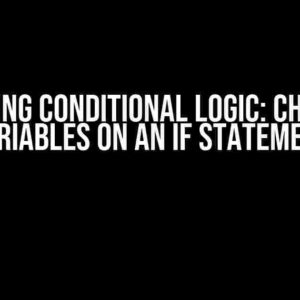When it comes to C++ programming, one of the most frequently asked questions is whether it makes sense to define the operator< as noexcept. In this article, we’ll delve into the depths of this query and explore the reasons behind this debate. Buckle up, folks, as we dive into the world of operator overloading and exception safety!
What is operator< and why is it important?
The operator< is a comparison operator that determines whether one object is less than another. It’s an essential component of various C++ concepts, including sorting, searching, and container operations. In other words, it’s a fundamental building block of the C++ Standard Library.
template<typename T>
bool operator<(const T& lhs, const T& rhs) {
return lhs.value < rhs.value;
}
In the above example, we’ve defined a generic operator< that compares two objects of type T based on their internal values. This operator is crucial for maintaining the ordering of elements in containers like std::vector or std::list.
What does noexcept mean?
In C++, the noexcept keyword is used to specify that a function does not throw any exceptions. It’s a compiler hint that tells the optimizer to generate more efficient code, as it won’t need to worry about stack unwinding and exception handling.
void foo() noexcept {
// This function does not throw any exceptions
}
By marking a function as noexcept, we’re making a promise to the compiler that it will never throw. If an exception is thrown despite this promise, the program will terminate abruptly, which is not exactly desirable.
Defining operator< as noexcept: is it a good idea?
Now that we’ve covered the basics, let’s get back to the original question: should we define operator< as noexcept? The answer is not a simple yes or no. It depends on the context and the guarantees provided by the underlying type T.
If the type T has a nothrow guarantee for its comparison operations, then marking operator< as noexcept makes perfect sense. This is because the operator is merely forwarding the comparison to the underlying type, and if that type has a nothrow guarantee, the operator itself won’t throw either.
template<typename T>
bool operator<(const T& lhs, const T& rhs) noexcept {
return lhs.value < rhs.value;
}
However, if the type T does not provide a nothrow guarantee, defining operator< as noexcept can lead to trouble. Imagine a scenario where the comparison operation throws an exception, and the program terminates unexpectedly due to the noexcept promise. Ouch!
Best practices for defining operator<
So, what’s the best approach for defining operator<? Here are some guidelines to keep in mind:
-
If the underlying type T has a nothrow guarantee for its comparison operations, mark operator< as noexcept.
-
If the underlying type T does not provide a nothrow guarantee, avoid marking operator< as noexcept.
-
If you’re unsure about the guarantees provided by type T, it’s better to err on the side of caution and avoid marking operator< as noexcept.
Remember, it’s essential to understand the underlying type’s behavior and guarantees before making promises to the compiler.
Exception safety and operator<
Another crucial aspect to consider is exception safety. In C++, exception safety refers to the ability of a program to maintain a consistent state even in the presence of exceptions. When defining operator<, we need to ensure that it provides strong exception safety guarantees.
A strongly exception-safe operator< ensures that if an exception is thrown during the comparison, the program’s state remains unchanged. This means that the operator should not modify the objects being compared or have any side effects that could compromise the program’s integrity.
template<typename T>
bool operator<(const T& lhs, const T& rhs) {
try {
return lhs.value < rhs.value;
} catch (...) {
// Rollback any side effects and rethrow
}
}
In the above example, we’ve implemented a strongly exception-safe operator< that catches any exceptions, rolls back any side effects, and rethrows the exception. This ensures that the program’s state remains consistent even in the presence of exceptions.
Conclusion
In conclusion, defining operator< as noexcept can make sense in certain contexts, but it’s essential to consider the underlying type’s guarantees and exception safety. By following best practices and understanding the intricacies of exception handling, we can write robust and efficient C++ code that provides strong exception safety guarantees.
Remember, when in doubt, it’s always better to err on the side of caution and avoid making promises to the compiler that we can’t keep. By doing so, we can ensure that our programs remain stable, efficient, and easy to maintain.
| Scenario | nothrow guarantee | Mark operator< as noexcept? |
|---|---|---|
| Type T has a nothrow guarantee | ✔ | ✔ |
| Type T does not provide a nothrow guarantee | ✖ | ✖ |
| Unsure about type T’s guarantees | ✖ | ✖ |
In the end, it’s all about making informed decisions and writing C++ code that’s both efficient and reliable. By considering the nuances of operator< and exception safety, we can create software that stands the test of time.
So, does it make sense to define operator< as noexcept? The answer is clear: it depends on the context, and we should always prioritize exception safety and robustness.
-
Understand the underlying type’s guarantees and behavior.
-
Avoid making promises to the compiler that we can’t keep.
-
Prioritize exception safety and robustness.
By following these guidelines and considering the intricacies of operator< and exception safety, we can write better C++ code that’s both efficient and reliable.
Frequently Asked Question
Get ready to dive into the world of operator< and noexcept, and find out if defining operator< as noexcept makes sense or not!
What is the purpose of the operator< in C++?
The operator< is a comparison operator in C++ that checks if the left-hand side operand is less than the right-hand side operand. It’s commonly used to implement custom comparators for user-defined types.
What does the noexcept keyword do in C++?
The noexcept keyword in C++ specifies that a function does not throw any exceptions. It’s a way to promise the compiler that a function is exception-free, which can help with optimization and error handling.
Is it a good idea to define operator< as noexcept?
Defining operator< as noexcept can be a good idea if you’re sure that the comparison operation won’t throw any exceptions. However, if the operator< might throw an exception in certain scenarios, it’s better to omit the noexcept specifier to avoid undefined behavior.
What happens if I define operator< as noexcept and it throws an exception?
If you define operator< as noexcept and it throws an exception, the program will terminate immediately, which can lead to unexpected behavior and crashes. This is why it’s crucial to be cautious when using noexcept and ensure that the operation is truly exception-free.
Are there any benefits to defining operator< as noexcept?
Yes, defining operator< as noexcept can provide benefits such as improved performance and optimization, as the compiler can assume that the operation won’t throw exceptions and make corresponding optimizations. Additionally, it can also help with code quality and readability by explicitly stating the exception-safety of the operator.




